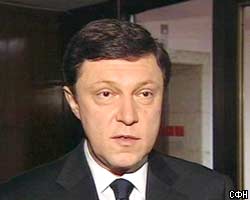 The
Yabloko party will not nominate its candidate for the presidential elections
in March 2004, because it believes that, in the present political situation
in Russia, fair and equal elections are impossible, Grigory
Yavlinsky, the leader of Yabloko, said after the party's congress at
the weekend. The
Yabloko party will not nominate its candidate for the presidential elections
in March 2004, because it believes that, in the present political situation
in Russia, fair and equal elections are impossible, Grigory
Yavlinsky, the leader of Yabloko, said after the party's congress at
the weekend.
In his opinion, Russia lacks an independent judiciary, politically important
independent media and the possibility to obtain independent financing for
election campaigns. "The recent parliamentary elections demonstrated
an excessive use of the so-called administrative resource," said Yavlinsky.
Speaking about the forthcoming presidential elections, he said their
format and terms were "unrealistic". Commenting on the possible
boycotting of the election, Yavlinsky said the party would make a special
decision on the issue.
The right-wing politician said his main goal over the next four years
was "to build a large democratic party that would act as an opposition
outside the State Duma". "Russia does not have such experience
today, but we will learn how to do it," he noted. Yavlinsky stressed
that Yabloko would cooperate with all democratic parties in the country
and would take part in all regionall elections, including regional legislative
assemblies.
He said that over 300 delegates from 75 regions of Russia had taken
part in the congress of the party.
Yabloko failed to pass the 5 percent threshold, required to gain representation
in parliament, in the last parliamentary elections. The party calculated
the votes independently from the Central Election Commission, and it said
the results announced by the Central Election Commission did not
comply with reality.
Yavlinsky said on December 9 that the election campaign to the State
Duma had been "dishonest and marred by irregularities". In particular,
he said, the campaign was marred by media bias against political parties
and blocs, especially on central TV channels. "Administrative resources
were used more than ever, both in the presentation of the parties and
during the process of vote counting," stressed Grigory Yavlinsky.
"Yabloko conducted its best election campaign," he added.
In his opinion, all parties that made it into the Duma, represent 'theparty
in power' in their attitude to a number of key issues. Moreover, two thirds
of the Duma "are simply the continuation of the government's and
the president's offices". This is another step towards the elimination
of public politics in Russia, in the opinion of the Yabloko leader. Nobody
in the Duma would represent the interests of citizens rather than the
interests of the authorities, he added.
It was suggested both before and after the parliamentary elections
that Yabloko should unite with another right-wing party, the SPS (Union
of Right-Wing Forces), which also failed to pass the 5 percent threshold,
and that the two parties could nominate a single candidate for President.
However, this did not happen.
See also:
Presidential
elections 2004
The 12th congress
of YABLOKO
State Duma elections 2003
|